About Intestinal Parasites
General Information
Hookworms inhabit the intestines and feed by grazing on small amounts of tissue. This results in blood loss and inflammation causing anemia, weakness, pale gums and even death, especially in puppies. Skin irritation and itching, especially of the paws, can be signs of a heavily infested environment because the larvae burrow into the skin causing itching and discomfort. Hookworm larvae are found in contaminated soil and can penetrate through the skin or be ingested orally, leading to infection. Females infected with hookworm can transmit larvae through their milk to their puppies.
Humans do not become infected with hookworm like dogs do. However, the larvae commonly migrate just under the skin resulting in painful lesions and raised, red welts. Strict hygiene is important, especially for children. Do not allow children to play in potentially contaminated environments. Frequent hand washing and bathing are essential in preventing human infections.
It is important to treat both your pets and the environment to prevent the transmission of hookworm. Most heartworm preventatives have an intestinal dewormer included, so that once a month you are protecting against not only heartworm disease but also roundworms and hookworms.
Life-Cycle
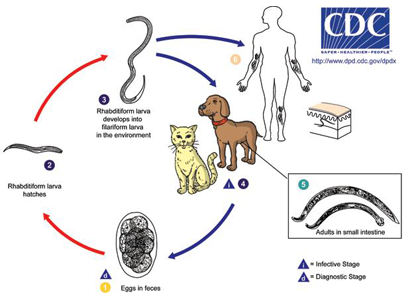
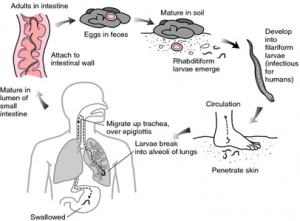
General Information
Roundworms live in the intestines and deprive their hosts of nutrients. Excessive infections can block the intestinal tract completely. Signs of infection include weight loss, malnutrition, swollen abdomen, and lack of appetite. Roundworm eggs are transmitted through contact with feces of an infected animal and are also transmitted through the milk.
Roundworms are most threatening to puppies because it can stunt their growth by robbing the puppy of vital nutrients. Infected puppies often have a pot-belly that is due to the growing roundworms inside the puppy’s abdomen.
Roundworms are considered zoonotic, meaning they are contagious to humans. Infection in humans can be much more severe than in dogs. Roundworm larvae can migrate through the tissues causing organ damage, blindness, and even death.
It is important to treat both your pets and the environment to prevent the transmission of roundworm. Most heartworm preventatives have an intestinal dewormer included, so that once a month you are protecting against not only heartworm disease but also roundworms and hookworms.
Life-Cycle
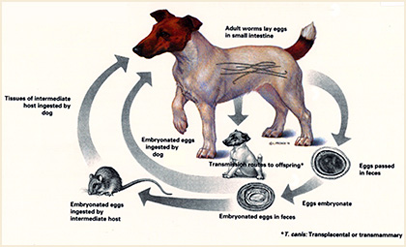
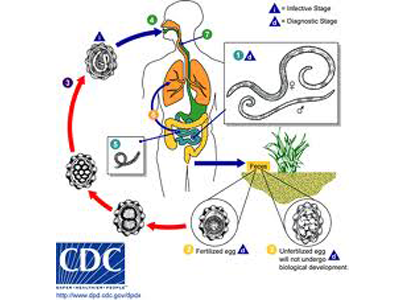
General Information
Whipworms are intestinal parasites which are about ¼ inch long and cause severe irritation to the lining of those organs, resulting in watery, bloody diarrhea, weight loss, and general debilitation. Whipworms are one of the worst types of parasites found in dogs.
The eggs are passed in the stool and can remain viable in the environment for years. Diagnosis can be difficult because whipworm only pass small numbers of eggs on an irregular basis. While this type of parasite is not usually found in Utah, dogs that travel outside this area should be considered at risk of contracting whipworms.
Whipworms are not infectious to people and are exclusively a dog parasite.
Life-Cycle
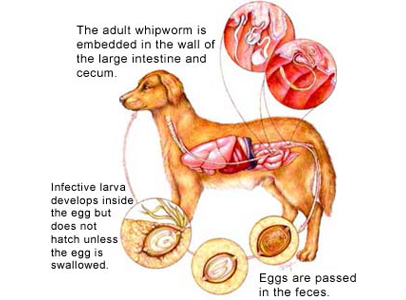
General Information
Tapeworms live in the small intestine and shed their egg-filled terminal segments in the feces of infected animals. The adult worms may reach up to 8 inches in length. The individual segments are developed from the head end and gradually mature and are shed from the opposite end. These segments are passed in the feces. If your pet is infected with tapeworms you may notice little rice-like grains near the rear of your pet or in their feces. As the tapeworm segment dries, it becomes a golden color and the fertilized eggs are released into the environment. Tapeworms do not normally cause serious health problems in dogs; however heavy infestation in puppies can be more serious, leading to lack of growth, anemia, and intestinal blockage.
Dogs cannot become infected by eating fertilized tapeworm eggs. Tapeworms must first pass through an intermediate host, a flea, before they can infect a dog or cat. Dogs become infected after swallowing an infected flea. Flea control is critical in the management and prevention of tapeworm infection. Flea control involves treatment of your dog and the environment.
Life-Cycle
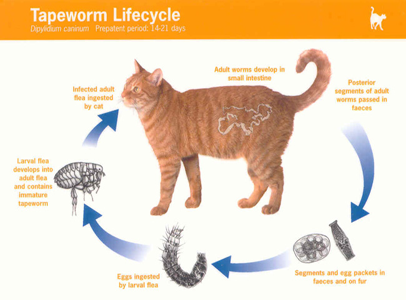
General Information
Giardia is commonly transmitted through drinking contaminated water. Dogs become infected by swallowing the cyst stage of the parasite. The cyst matures inside the intestines and then is passed in the stool where it stays in the environment and can infect other dogs. Most dogs will not have diarrhea or any other signs of illness. Symptomatic dogs will have watery diarrhea, and in puppies and debilitated adults it can be severe enough to be fatal.
Giardia is diagnosed by performing a microscopic examination of a stool sample or through an antigen test that is performed in the hospital. It is usually treated with an antibiotic for 5-7 days.
Giardia can cause diarrhea in humans. If your dog is diagnosed with giardia, it is important to disinfect your environment using diluted bleach, usually 1 cup of bleach per 1 gallon of water. Make sure that the disinfected area is allowed to dry thoroughly prior to reintroducing your pets.
Life-Cycle
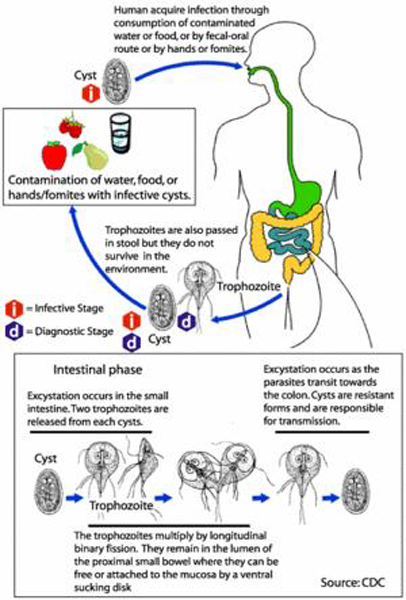
General Information
Coccidia is an organism that causes an infection in the intestines of infected animals. Most animals will not have diarrhea or any other signs of illness. Symptomatic dogs will have watery diarrhea, and in puppies and debilitated adults it can be severe enough to be fatal.
Coccidia can survive in the environment for a long time and becomes infectious when it is ingested by a susceptible dog. It is commonly transmitted through drinking contaminated water.
Life-Cycle
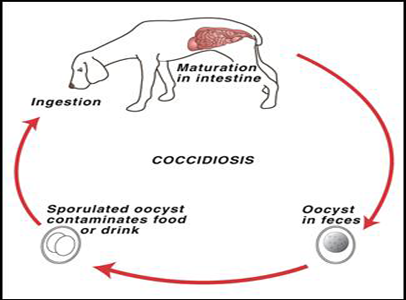
For more information or if you have any questions or concerns with your pet, please feel free to contact us here at Borrett Animal Hospital today!


